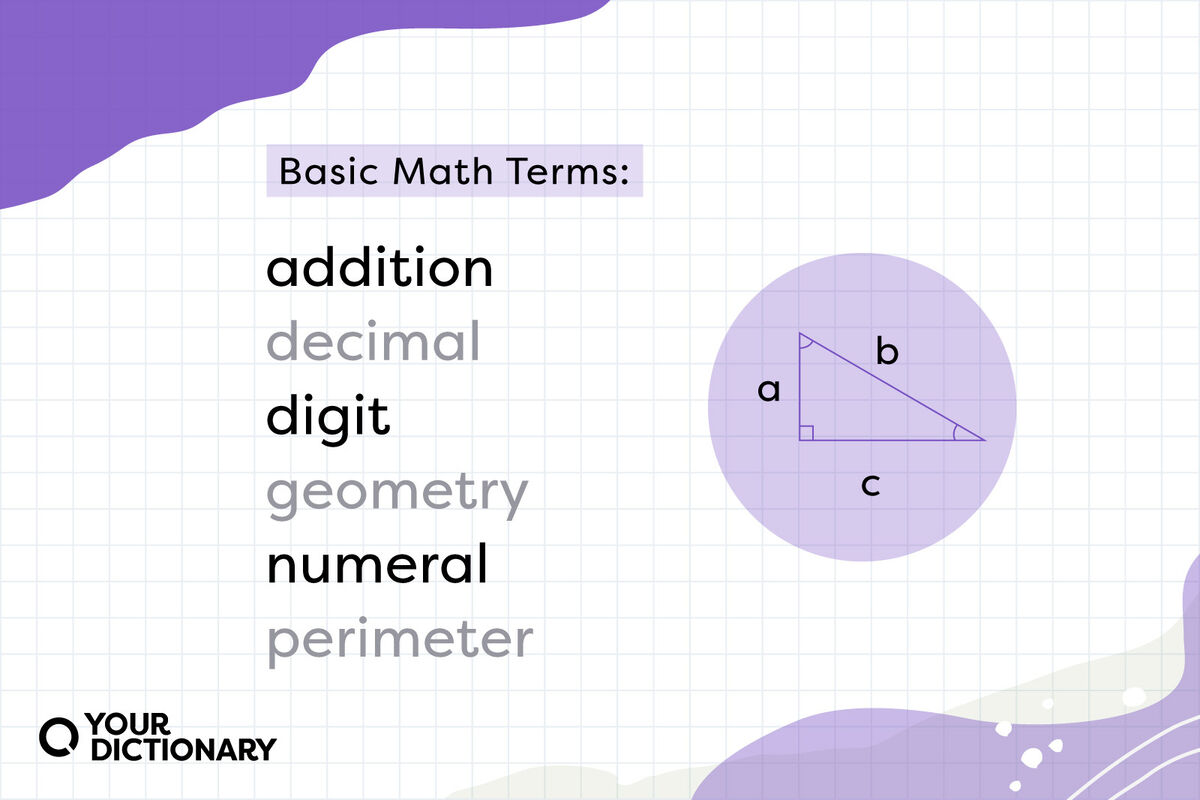The Ins and Outs of Math Terms: A Glossary

Believe it or not, there are a lot of words in math — and if you don’t know them, it’s going to be hard to work with the numbers they describe. An understanding of basic math terms goes a long way, no matter if you consider yourself a “math person” or not.
Counting and Cardinality Terms
Counting and quantities are building blocks to higher math skills, such as order of operations and geometry. Terms found in a counting and cardinality list include:
- array - set of numbers or objects in rows and columns
- cardinal numbers (cardinality) - number words that mark quantity (e.g. one, two, three)
- digits - numerals found in all numbers; includes one-digit numbers (e.g. 0, 7, 4) and multi-digit numbers (e.g. 12, 284, 5746)
- equal - having the same value
- greater than - having a higher value
- less than - having a lower value
- numeral - written symbol that indicates a value (e.g. 1, 2, 3)
- one-to-one correspondence - understanding that numbers correspond to quantities (e.g. five apples, sixteen cars)
- ordinal numbers (ordinality) - number words that mark an item’s position in a sequence (e.g. first, second, third)
- sequence - collection of numbers or objects in a particular order
Operations and Algebraic Thinking Terms
Addition, subtraction, multiplication, and division are known as the order of operations. Students need to know the basic terms for these skills, including:
- addend - the two numbers added together in an addition problem
- addition - combining two numbers to make a new total (sum)
- algebra - branch of mathematics in which students solve for the value of variables (symbols or letters)
- arithmetic - the study of numerical quantity using counting and operations (addition, subtraction, multiplication, division)
- associative property - mathematical property by which three or more numbers can be grouped in any way and still have the same sum (addition) or product (multiplication)
- average (mean) - the sum of numbers divided by the count of numbers
- commutative property - mathematical property that states that numbers can be added or multiplied in any order and still have the same answer
- compose - putting a number back together from sets of ones, tens, hundreds, etc.
- composite number - any number that can be divided by more numbers than 1 and itself (opposite of a prime number)
- difference - the result of a subtraction problem
- distributive property - mathematical property by which the sum of two numbers multiplied by a third number is equal to the products of the first two numbers individually multiplied by the third number
- dividend - number being divided into parts
- division - process of dividing one number into a set number of parts
- divisor - number that divides the dividend into parts
- equation - number statement that shows two equal expressions on either side of an equal sign
- even number - any number that is divisible by 2
- factor - number that divides into another exactly (e.g. 3 is a factor of 12)
- formula - equation that describes the consistent relationship between variables (e.g. the formula for volume: V = lwh)
- identity property - mathematical property by which the sum of any number and 0 is itself (in addition), and the product of any number and 1 is itself (multiplication)
- integer - whole number (including zero)
- minuend - the top number in a subtraction equation; the number that is subtracted from
- multiplicand - each number in a multiplication problem
- multiplication - repeated addition of one number a set amount of times
- odd number - any number that can’t be divided by 2
- operation - addition, subtraction, multiplication, or division
- order of operations - the order in which you solve an algebraic equation (Parentheses, Exponents, Multiplication, Division, Addition, Subtractions — also known as PEMDAS)
- parentheses (also brackets or braces) - symbols that indicate multiplication in an equation, or group numbers to be calculated first in the order of operations
- product - the result of a multiplication problem
- prime number - number that is only divisible by itself and 1
- quotient - result of a division problem
- remainder - the amount left over when a divisor does not divide evenly into a dividend
- subtraction - one number minus or taking away another number.
- subtrahend - the number subtracted from the first number in a subtraction problem
- sum - the result of an addition problem
- variable - letter that represents the value that one must solve an equation to find
- whole number - a number without fractions; a number that has all the parts of a whole


